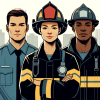Many people believe that a great resume will be their ticket to a firefighter job; nothing is further from the truth.
A great resume packed with accomplishments and achievements will probably open a door for you into the testing process, but it will not necessarily secure the job by itself. The Fire Service hires people, not resumes. It is not uncommon for candidates to think that if they have to have the highest level of education, the most number of volunteer hours, and every certificate known to man on their resume, they will get hired as a firefighter.
Don’t get me wrong, it is very important to have some quality and substance on your resume. The missing link is that you actually have to sell to the oral board those qualifications you are presenting to them. Having the resume sitting on the table in front of the oral board without being able to link how those items will help you become a successful firefighter for that agency is a common problem for many candidates.
On that same note, the oral board does not want to hear you just rattle off your resume item-by-item. They want to hear you link each item into each question, to demonstrate you have the knowledge, skills, and abilities to succeed. I know countless candidates that have great resumes, and have turned out to be mediocre firefighters or have never been hired. A great resume does not always equate to a great firefighter.
This may be why it seems to be more common for many departments to not allow resumes at the entry-level oral board interview. Why? Because they are hiring a person, not a resume. Plus, I think too many candidates expect the resume to speak for itself, when in reality you should be speaking for yourself and explaining not only your qualifications but your attitude and personality.
You must sell not only your qualifications, but yourself as a person, a representative of the fire service, a co-worker and roommate and why over all others you are best suited for the position and agency you are applying for.
When you go into an oral board interview, you should always expect the panel to not have your resume and job application in front of them to review. Why would you do that? Because your presentation and answering of questions should not matter whether or not those items are available to them. Yes, it would be nice if they were there so they could ask questions of you; however, consider it a bonus if they do. If you prepare for them not having those items, you won’t be disappointed or stressed out if they don’t have them.
Regardless, your opening statement, closing statement, and answers to your questions should be delivered the same, whether or not the oral board has access to your resume and job application. A successful candidate will be able to talk about themselves so well that they are able to integrate their entire resume into each and every question they are asked (in an organized fashion, not just by listing bullet pointed items as if you were reading from a list).
You need to have certain qualifications on your resume just to take as many tests as you can qualify for. The most common qualifications necessary on your resume will be your EMT (or paramedic), and your Firefighter 1 academy certificates (or state Firefighter 1 certificates). Those are the ones that most departments look for above and beyond 18 years of age and a high school diploma/G.E.D.
Yes, we want to see some fire related education, work experience, and volunteer experience, and maybe a few certificates to prove your commitment and dedication to the fire service. Just don’t get yourself feeling that you need a whole page dedicated to certificates (yes, I have seen that) on your resume to get the job.
It’s great if you can do that, but remember that 100 percent of your oral board score is going to the main dimensions you are being evaluated on: oral communications, problem-solving ability, decision-making, maturity and interpersonal skills (just to name a few). An awesome resume is useless if you do not have those dimensions dialed in.


